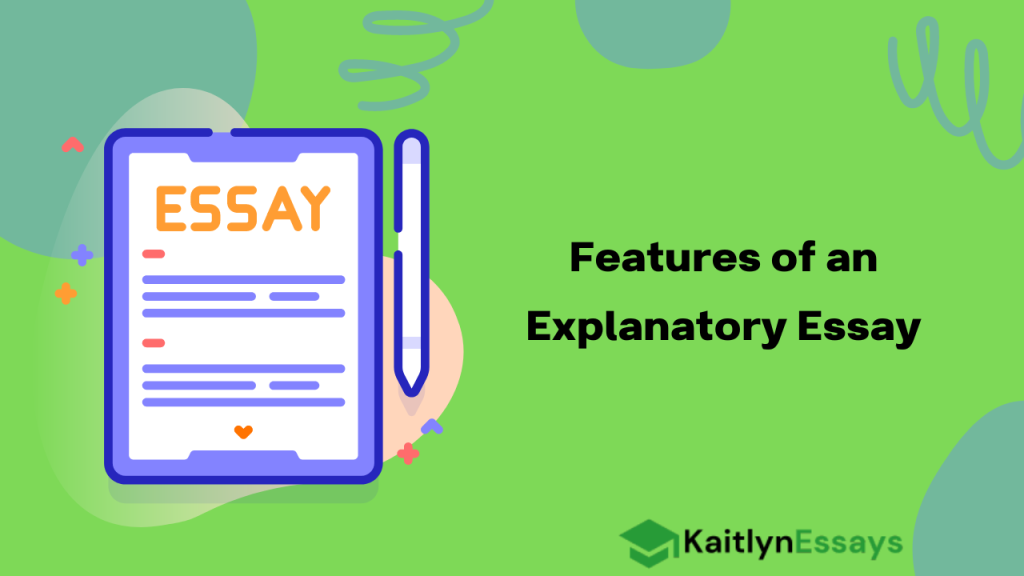
An explanatory essay is a type of writing that aims to explain, describe, or inform the reader about a particular topic, concept, process, or idea. It is a common type of essay that you may be asked to write in school or college. The main goal of an explanatory essay is to help the reader understand something better by providing clear and detailed information.
Unlike an argumentative essay, where you try to convince the reader of a particular viewpoint or opinion, an explanatory essay is more objective and focuses on presenting facts and information in a logical and organized manner. It is like having a friendly teacher or guide who walks you through a subject step-by-step, making sure you understand every aspect of it. This paper examines the features of an explanatory essay, exploring its structure, tone, use of evidence, and overall effectiveness.
Struggling to find the time to write your essay?
Balancing your studies, work, and personal life can make it challenging to find the time to write your essay. Our academic writing services are here to help. We’ll take the writing off your plate, allowing you to focus on other priorities. Trust us to deliver a well-written, thoroughly researched essay that meets your professor’s expectations
1. Clarity and Objectivity
An essential feature of an explanatory essay is clarity. The primary objective is to present information in a clear and understandable manner. This necessitates lucid language, logical organization, and concise explanations. The writer must avoid ambiguity and vagueness, ensuring that readers can grasp the subject matter without confusion.
Furthermore, explanatory essays should maintain objectivity. While the writer may have personal opinions or biases, these should not influence the presentation of information. Instead, facts, evidence, and rational analysis should guide the narrative. By adopting an objective stance, the essay gains credibility and fosters trust among readers.
According to Katherine (2018), maintaining clarity and objectivity is crucial in explanatory writing, as it allows readers to engage with the content more effectively. By prioritizing clarity and objectivity, writers can ensure that their essays serve their intended purpose of informing and educating the audience.
2. Informative and Educational

Another key feature of explanatory essays is their informative nature. These essays aim to provide readers with new knowledge or insights into a particular topic. Whether explaining a scientific concept, historical event, or literary work, the essay should offer valuable information that expands the reader’s understanding.
Moreover, explanatory essays have an educational function. They serve as vehicles for learning, helping readers gain knowledge and comprehension about diverse subjects. This educational aspect distinguishes explanatory essays from other types of writing, as their primary goal is to impart understanding rather than persuade or entertain.
As noted by Johnson (2019), the informative and educational aspects of explanatory essays make them valuable tools in academic and professional settings. By presenting information in a clear and accessible manner, these essays facilitate learning and promote intellectual growth.
3. Structure and Organization
Effective explanatory essays exhibit a coherent structure and organization. They typically follow a traditional essay format, including an introduction, body paragraphs, and a conclusion. The introduction sets the stage for the essay, providing background information and stating the main thesis or purpose. Body paragraphs explore specific aspects of the topic, presenting evidence, examples, and explanations. Finally, the conclusion summarizes the key points and reinforces the main thesis.
Within the body paragraphs, explanatory essays often employ a hierarchical structure, with main ideas supported by subpoints and evidence. This structure helps readers navigate the content and understand the relationship between different concepts.
According to Harper (2020), a well-organized structure is essential in explanatory essays, as it enhances readability and comprehension. By arranging information logically and cohesively, writers can guide readers through complex topics with clarity and precision.
4. Use of Evidence and Examples

Evidence plays a critical role in explanatory essays, bolstering the writer’s claims and assertions. This evidence may take various forms, including empirical data, scholarly research, expert opinions, and real-life examples. By incorporating diverse sources of evidence, writers can strengthen the credibility of their arguments and provide readers with a comprehensive understanding of the topic.
Furthermore, explanatory essays often utilize examples to clarify abstract concepts or illustrate key points. These examples serve as concrete instances that help readers grasp the significance of the information presented. Whether drawn from personal experience, historical events, or case studies, examples enhance the clarity and persuasiveness of the essay.
According to Lee (2017), the effective use of evidence and examples distinguishes exemplary explanatory essays from mediocre ones. By selecting relevant and credible sources, writers can build persuasive arguments and engage readers more effectively.
5. Formal Tone and Style
Explanatory essays typically adopt a formal tone and style. This reflects the objective, informative nature of the genre and contributes to the credibility of the writing. Formal language, proper grammar, and professional vocabulary are commonly employed to convey authority and expertise.
Moreover, the tone of explanatory essays is often neutral or impartial, avoiding emotional language or subjective opinions. Instead, writers maintain a measured and objective stance, focusing on presenting information and analysis without bias or prejudice.
As highlighted by Trevor (2020), the formal tone and style of explanatory essays contribute to their effectiveness as academic and professional documents. By adhering to established conventions of writing, writers can communicate their ideas with clarity and authority, enhancing the overall impact of their essays.
How Can I Make my Explanatory Essay More Engaging for the Reader
To make your explanatory essay more engaging for the reader, consider the following strategies:
- Offer a Solution or Recommendation: Instead of simply summarizing your main points, offer suggestions or recommendations based on the information you’ve presented. This can help make your essay more impactful and leave a lasting impression on your readers.
- Emphasize the Importance of Your Topic: Use your concluding statement to emphasize the importance of your topic and why it’s relevant to your readers. This can inspire action or change and make your essay more memorable.
- End with a Powerful Quote or Statement: End your essay with a powerful quote or statement that reinforces your main point or leaves a lasting impression on your readers. This can be particularly effective if the quote is from a respected authority or has a strong emotional resonance.
- Use Clear and Concise Language: Use simple and direct language to explain complex concepts. Avoid jargon and technical terms that might confuse your readers. Use vivid and relatable examples to illustrate your points and make them more memorable.
- Create a Logical Flow: Organize your essay in a logical and structured manner, using transitions and strong connections between ideas to guide your readers through the content. This helps to maintain reader interest and ensure your message is effectively conveyed.
- Use Visual Aids: Incorporate visual aids such as images, charts, or infographics to enhance reader engagement by providing a visual representation of the information being discussed. This can make your essay more engaging and easier to follow.
- Engage Your Readers: Pose questions, use anecdotes, or tell stories to engage your readers and make your essay more relatable. This can help readers feel more connected and invested in the content.
- Know Your Audience: Understand your target readers and tailor your content to their needs, preferences, and knowledge level. This ensures that your essay delivers relevant and valuable information that resonates with your audience.
Conclusion
Explanatory essays serve a crucial role in academic, professional, and informational contexts. Characterized by clarity, objectivity, and a focus on education, these essays aim to inform and enlighten readers about diverse subjects. By employing a structured approach, utilizing evidence and examples, and maintaining a formal tone, writers can create compelling explanatory essays that deepen understanding and foster intellectual growth.
Through an exploration of the features outlined above, it becomes evident that explanatory essays play a vital role in disseminating knowledge and facilitating learning. As writers continue to refine their skills in explanatory writing, they contribute to the advancement of scholarship and the dissemination of valuable information across various disciplines.
Running out of time to finish your paper?
Feeling the pressure of a looming deadline for your paper? Our academic writing experts can provide the support you need to get it done. We’ll work efficiently to research, outline, and write a compelling paper that showcases your understanding of the topic. Trust us to deliver a polished final product that will impress your professor.
FAQs
What is an explanatory essay?
An explanatory essay is a type of academic writing that aims to elucidate or explain a particular topic, concept, or phenomenon. Unlike persuasive or argumentative essays, which seek to convince the reader of a specific viewpoint, explanatory essays focus on providing information and fostering understanding.
What are the key features of an explanatory essay?
The key features of an explanatory essay include clarity, objectivity, informativeness, educational value, structured organization, use of evidence and examples, and a formal tone and style.
How does an explanatory essay differ from other types of essays?
An explanatory essay differs from other types of essays, such as persuasive or argumentative essays, in its primary objective. While persuasive essays aim to persuade the reader to adopt a particular viewpoint, and argumentative essays seek to present arguments supporting a specific position, explanatory essays focus on providing information and clarification without advocating for a particular perspective.
What is the structure of an explanatory essay?
An explanatory essay typically follows a traditional essay structure, including an introduction, body paragraphs, and a conclusion. The introduction provides background information and states the main thesis or purpose of the essay. Body paragraphs explore specific aspects of the topic, presenting evidence, examples, and explanations. The conclusion summarizes the key points and reinforces the main thesis.
How should evidence and examples be used in an explanatory essay?
Evidence and examples play a crucial role in an explanatory essay, as they help support the writer’s claims and clarify complex concepts. Writers should select relevant and credible sources of evidence, including empirical data, scholarly research, expert opinions, and real-life examples. These should be integrated seamlessly into the essay to strengthen the credibility of the arguments presented.
What tone and style are appropriate for an explanatory essay?
Explanatory essays typically adopt a formal tone and style, reflecting the objective, informative nature of the genre. Formal language, proper grammar, and professional vocabulary are commonly employed to convey authority and expertise. The tone is often neutral or impartial, avoiding emotional language or subjective opinions.
How can I ensure that my explanatory essay is effective?
To ensure the effectiveness of an explanatory essay, writers should prioritize clarity, objectivity, and educational value. They should present information in a clear and understandable manner, avoid bias or personal opinions, and focus on providing valuable insights that deepen the reader’s understanding of the topic. Additionally, adherence to proper essay structure, use of evidence and examples, and maintaining a formal tone are essential for creating a compelling explanatory essay.
Are there any tips for writing a successful explanatory essay?
Some tips for writing a successful explanatory essay include conducting thorough research on the topic, outlining the essay before writing, selecting credible sources of evidence, organizing ideas logically, and revising the essay for clarity and coherence. It’s also helpful to seek feedback from peers or instructors to ensure that the essay effectively achieves its intended purpose of explaining the topic to the reader.
